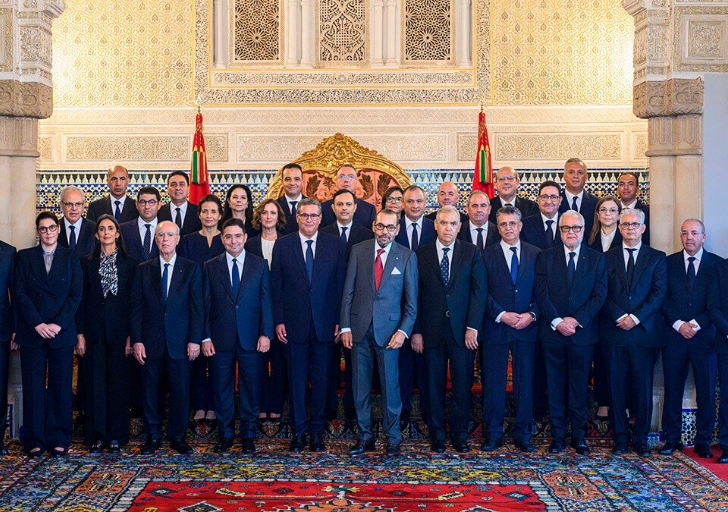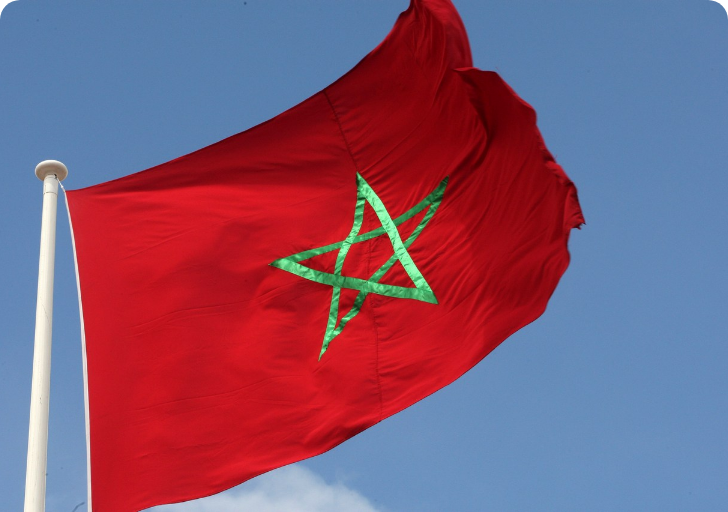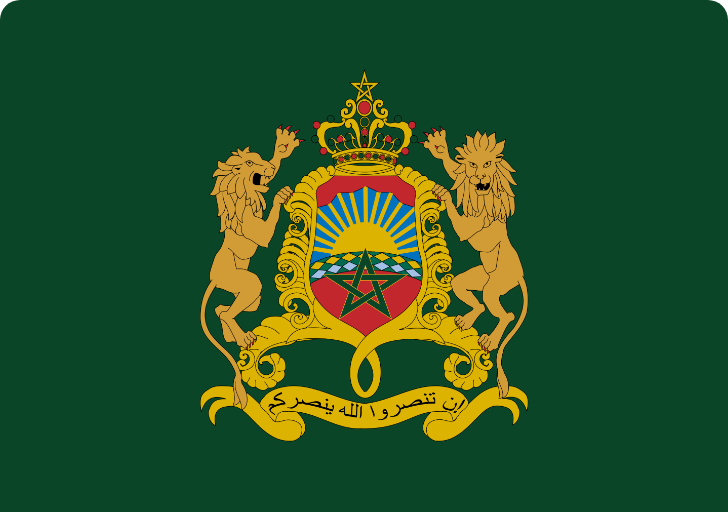Full Text of HM the King's Speech to 27th Arab Summit
HM King Mohammed VI sent a speech to the 27th Arab Summit which kicked off on Monday in the Mauritanian capital Nouakchott.
Here follows the full text of the speech which was read out by Foreign Minister Salaheddine Mezouar:
Your Excellency, Mr. Mohamed Ould Abdel Aziz, President of the Islamic Republic of Mauritania, Chairman of the Summit,
Your Majesties,
Your Excellencies,
Your Highnesses,
Your Excellency, Mr. Secretary General of the League of Arab States,
Ladies and Gentlemen,
First of all, I should like to extend my thanks and appreciation to His Excellency Mr. Mohamed Ould Abdel Aziz, President of the Islamic Republic of Mauritania and to our Mauritanian brothers and sisters for hosting this 27th Arab Summit. I congratulate you, Mr. President, on the excellent arrangements for this Summit.
I also commend His Excellency Abdel Fattah al-Sisi, President of our sister nation the Arab Republic of Egypt and Chairman of the last Summit, for his endeavors to serve Arab causes.
Allow me also to offer my sincere congratulations to His Excellency Mr. Ahmed Aboul-Gheit, the new Secretary General of the League of Arab States and to wish him success in his high office. I am convinced that thanks to his vast expertise, wisdom and clear-sightedness, he will succeed in his mission and will direct Arab efforts towards achieving greater unity, from which Arab citizens will benefit directly.
My sincere thanks also go to Dr. Nabil Elaraby, whose term at the head of the Arab League Secretariat ended in June. I commend him for his services to the Arab Ummah and for the seriousness and sense of responsibility which characterized his action. I wish him continued good health and well-being.
Your Majesties,
Your Excellencies,
Your Highnesses,
The Kingdom of Morocco's decision to postpone its right to host the Arab Summit does not mean Morocco has given up on joint Arab action or hindered any effort to ensure the success of the twenty-seventh Summit session, which is being held today, and which our sister nation Mauritania is kindly hosting. My country’s decision was, in fact, dictated by a duty to undertake an objective, impartial analysis of the situation prevailing in the Arab world and by the need to draw attention to the internal and external risks of division looming over Arab countries. The aim, in fact, was to bolster resolve to address those schemes, regain control of decision-making and chart a future that not only fulfils our peoples’ aspirations for development, but is also worthy of the cultural standing of the Arab Ummah.
Needless to say, this is not the place to give lessons or vie for the most pertinent analysis of the situation. What matters, above all, is to embed in our collective consciousness the firm belief that unity is absolutely necessary if we want to rise to the cultural challenge which consists in building modern states rooted in civic values, the rule of law and commitment to territorial integrity and national sovereignty.
- Since when has division been a source of strength? Can any one of our countries – on its own – rise to the challenges we have in common, without our complementing and supplementing one another?
- Is it not true that ready-made solutions, contrived, bombastic theories and separatist tendencies have led to endless fragmentation, to the extent that states become neighborhoods or districts?
- Is it not a fact that state sovereignties have been trampled on, supposedly to defend a sect’s doctrine or a given slogan? Is it not true that the spirit of citizenship has often been sacrificed on the altar of loyalties, for no other reason than to tamper with minds and achieve hegemony?
The constructive jihad is jihad vis-a-vis ourselves to build confidence; jihad to put our house in order so that we may solve our problems among ourselves, away from any external influences that only complicate matters and delay problem-solving, which only leads to a waste of effort, energies and resources.
That is the vicious circle we find ourselves in. It is also one of the main factors which have eroded our ability to resolve Arab issues - such as the crises in Libya, Yemen, Syria, Iraq and Lebanon - and to deal effectively and judiciously with the phenomenon of terrorism, which is ruining the minds of some of our citizens and undermining our countries’ security and safety.
- How is it possible that we should fail to be at the forefront of those who are developing multi-dimensional strategies and effective, practical plans to confront this destructive scourge, of which we are the source as well as the target?
- How can anyone claim that our pristine Islamic faith - the religion of moderation, the middle-of-the-road faith - is prevailing when extremists and terrorists are continuing to distort it in order to justify their criminal acts against individuals and nations, without our refuting their biased interpretations and false arguments through appropriate means?
- Is it fair that a distorted image should be associated with us and our children in the eyes of the community of nations, when we are the torch-bearers of a message of enlightenment, we have made proven contributions to the development of human civilization and we are duty-bound to continue to interact with other nations, for the good of mankind?
It would, indeed, be a mistake to think one can single-handedly, merely through one’s own resources, shield oneself from terrorism, without cooperating and coordinating action in the region and with the world around us. As we all know, terrorism is a cross-border phenomenon, and the only way to defeat it is by working together to achieve security and promote development.
Your Majesties,
Your Excellencies,
Your Highnesses,
It is clear the international community is, to a large extent, responsible for the postponement of a just settlement of the Palestinian issue. It is obvious, also, that this procrastination is due to Israel’s refusal to abide by the relevant resolutions of international law as well as to its continuing settlement building policy which, day after day, undermines the two-state solution: an Israeli State and a Palestinian State. The latter should be established on the Palestinian territories occupied in 1967, and should be sovereign and viable.
We, Arabs, put the Arab Peace Initiative on the table in 2002 and are still proposing it as a basis for achieving security, peace and integrated development in the region. In this respect, we wish to draw attention to the fact that any attempt to impose the status quo and the fait accompli policy will be useless and will not change the course of history.
Regarding the situation in Al-Quds al-Sahrif, as Chairman of the Organization of Islamic Cooperation’s Al-Quds Committee I would like to stress the need to safeguard the city’s Arab and Islamic identity and its legal status as a part of the Palestinian territories occupied in 1967 and as the capital of the independent State of Palestine. Ignoring this fact or attempting to Judaize East Al-Quds would be an aggression against identity and against roots, and it would be a cause for strife.
Because we are committed to peace, we support any meaningful initiative aimed at providing realistic incentives and bringing about the right conditions for the implementation of the two-state solution, including the French initiative, which has a comprehensive international dimension, and the Egyptian endeavor, which has a realistic regional impact. This is in line with our call for negotiations between the Palestinians and the Israelis to resume. However, we do not want these negotiations to be without a clear objective and a specific framework; nor do we want them to take place while the causes that led to their failure in the past are still there.
The unity of Palestinian ranks and support for the Palestinian leadership, with my brother His Excellency Mr. Mahmoud Abbas, President of the State of Palestine at the helm, are two crucial elements in this regard. Just as important is the need to support the Palestinian cause sincerely, without any political calculations or ulterior motives.
Your Majesties,
Your Excellencies,
Your Highnesses,
The greatest challenge for us is to win the battle for development by making up for lost time in terms of ensuring capacity-building, combating poverty and vulnerability in our countries and overcoming hurdles to our economic and commercial cooperation.
We must remain focused on designing and developing the right partnerships within the Arab family with regard to needs, priorities and areas of cooperation so as to boost the development dimension in our joint action. All our endogenous capacities should be leveraged to enable Arab citizens to enjoy a serene, dignified life.
We are not lacking in innovative thinking, skilled human resources, a suitable institutional framework or natural resources that serve as a catalyst. What is important, in fact, is to believe in investment in the future, in real solidarity and in gradual benefits, to be reaped slowly but surely.
Implementing development projects in accordance with these principles and structural procedure and using a participatory approach, particularly with regard to the private sector, may lead to success stories that can be a real catalyst for investment and competitiveness all over the Arab region.
I hope the spirit of solidarity will prevail today so future generations may, tomorrow, reap the fruits of structural, economic, commercial, technical, scientific and cultural projects carried out within the framework of the League of Arab States. In this way, our Organization can gain in stature in the eyes of Arab citizens and play its role as a driving force to spur exchange and cooperation with other regional blocs and have a positive impact on the global economy.
May Almighty God assist us and guide our steps for the well-being of the Arab Ummah. He is All-Hearing, All-Seeing, Most Responsive.
MAP 25 July 2016







